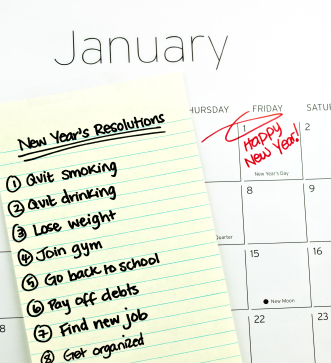Seven Strategies for Highly Effective New Year’s Resolutions

(Reprinted from original CourageWorks column in Forbes Magazine)
We’ve all been there: Brimming with resolve on December 31st as we boldly declare the goals and changes we plan to make in the year ahead, and by January 31st that resolve has evaporated into the crisp winter air, nowhere to be found. New Year Resolutions? Bah Humbug.
There’s a reason less than 10% of people ever see their New Year’s resolutions into reality and end up stuck in the same ruts year after year: Change is difficult. Heck, if it were easy to keep our resolve and stick with the changes we commit to making as we sip champagne on New Year’s Eve, we’d all be meditating daily, looking svelte in our jeans, drinking plenty of water, snacking on raw veggies, and free of credit card debt. While we all have the ability to make important changes in our life and to keep our New Year’s resolutions, we often just lack the strategies needed to see them through.
There’s a science to success when it comes to achieving goals and making important life changes. Using the right strategies can make the vital difference between progress and procrastination, success and failure!
Here are the top things that help you not just stick to your resolutions, but create the right ones to begin with!
1. Know Your Why. For a resolution to stick, it has to be aligned with your core values. We all want to look better or get richer, but your resolutions have to go beyond superficial desires and connect with what truly matters most to you. In other words, you have to “Know Your Why” and feel truly passionate about the goals you set yourself. If you don’t, then when the going gets tough or your alarm goes off at 5.30am, you won’t have the resolve to stick to your plan. Connect your resolutions to those things align with your core values. When your resolutions connect to a deeper sense of purpose, it compels you not to think small or play safe, but to dig deep when the going gets tough and stay the course – no matter how many hurdles.
2. Be Specific. Resolutions to ‘eat better, get fitter, be happier, relax more or have better life balance’ are doomed for failure because they lack specificity. The more specific you are, the more likely you will be able to succeed. Describe your goals and resolutions in ways that allow you to track your progress and measure your success. For instance, if you want to build a better relationship with your partner, schedule at least one date night per month, or, as I’ve done with my husband, one weekend away – sans kids – per year. Likewise if you’re committed to a better health and exercise regime, schedule how many workouts you’ll fit into each week.
3. Design Your Environment. Never underestimate the power of your environment to support or sabotage your success. Design your environment so that it’s hard NOT to do what you’ve resolved to do. Create a progress chart, recruit a cheer squad among your family and friends, find someone to hold you accountable, hire a trainer, join a group, create a blog. Likewise, if there are people or things in your life that pull you down or off track, address them directly and set whatever boundaries you know you will need upfront.
 4. Focus Attention. Being ambitious is great. But trying to do too many things at once can make you so unfocused that you just bounce around like an over-caffeinated Tigger, not quite sure which direction you are going. Set yourself up for success and start with just one major undertaking come January 1st. Then break that goal down into small bite size steps. Small steps, strong start!
4. Focus Attention. Being ambitious is great. But trying to do too many things at once can make you so unfocused that you just bounce around like an over-caffeinated Tigger, not quite sure which direction you are going. Set yourself up for success and start with just one major undertaking come January 1st. Then break that goal down into small bite size steps. Small steps, strong start!
5. Don’t Just Think It, Ink it! A Stanford University study found that when people wrote down their goal, it increased the probability of them achieving it by over 70%. But don’t just write down the specific goal, write down how you will feel when you’ve accomplished it. When you have finished penning your desires, jot down on sticky pads the words that inspire you most about your goal and put them around your home/office to remind you of why you are committed to doing what it takes to bring your goal into reality.
6. Practice Patience. It’s easy to get caught up in an initial wave of enthusiasm, confidant that your efforts will meet with early success, only to come crashing down when they don’t. Rather than being preoccupied with the results you want, focus more on the process, and develop greater competence of the actual activity or skill itself. For instance, if you want to become more fit, focus on being able to jog a little bit further every time you go for a walk, rather than being able to run 5 miles by day five. Remember, small steps. If you stick with the process and embrace the inherent learning, you will ultimately meet with success. Promise!
7. Forgive Failure. Your failures will not define your success in the year ahead, or in any year for that matter. HOW YOU RESPOND TO THEM WILL. If you happen to mess up, lose your resolve, press the snooze button or revert to a familiar and well-practiced behavior, don’t beat up on yourself. Okay, so you didn’t get to the gym like you’d planned. How about 5 minutes of stretching? When it comes to slipping up and tripping up, you are in good company. It happens to everyone. Just don’t let your mishaps, setbacks and failures mean more than they do. Reflect on the lessons they hold, make adjustments accordingly, then tap your inner John Wayne and get back in the saddle. Life rewards those who work at it.
Making changes to any aspect of your life demands focused effort, perseverance, and a good measure of boldness. But no more than you already have. So as you ready yourself to step into a new year, I challenge you to step beyond the doubts, excuses and stories that have kept you from experiencing the best of who you are. Trust in yourself more deeply, and boldly resolve to create a future that’s worthy of you.


